GBA Green Business Area, a vector of sustainable energy and jobs in Mali
Joint interview with Grégoire Gailly, GBA Programme Manager, and Cécile Henriot, West Africa Director
Reading time: 7 minutes.
Background. In West Africa, Geres has chosen to facilitate energy access for Very Small Enterprises (VSEs) and Rural Micro-Businesses (RMBs) established in villages with little or no access to electricity. The concept? Green Business Area or GBA. The project took root in the Malian countryside in 2015 in Konséguéla, followed by Koury in 2019.
Its satisfaction with the dynamics created by the first GBAs has led Geres to work on ways to replicate this kind of project in Mali and West Africa more generally. Grégoire and Cécile talk to us about the concept, the scaling-up strategy and future prospects.
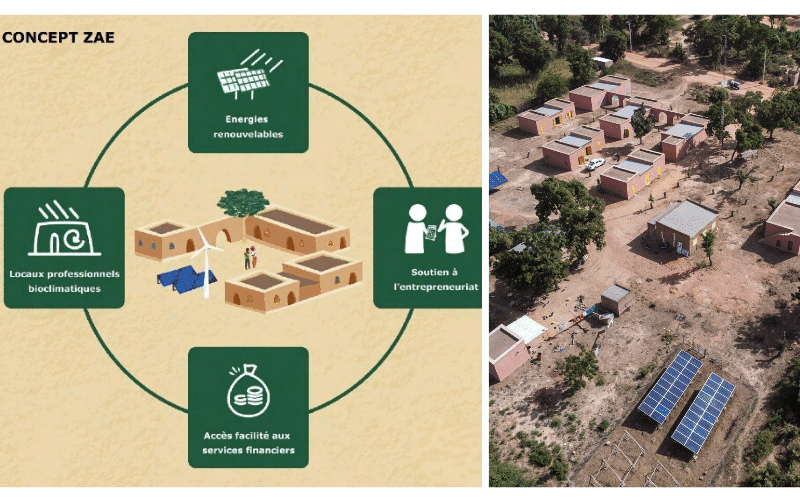
In practice, what is a GBA (Green Business Area) and what does it look like?
The concept is built on four pillars:
- Erecting a set of bioclimatic (i.e. in harmony with the climate and ecosystem) commercial buildings designed to host small businesses
- Installing a source of high-quality renewable energy available to everyone 24/7
- Offering support to entrepreneurship (training, business management, etc.)
- Facilitating access to finance for the small businesses in the GBA.
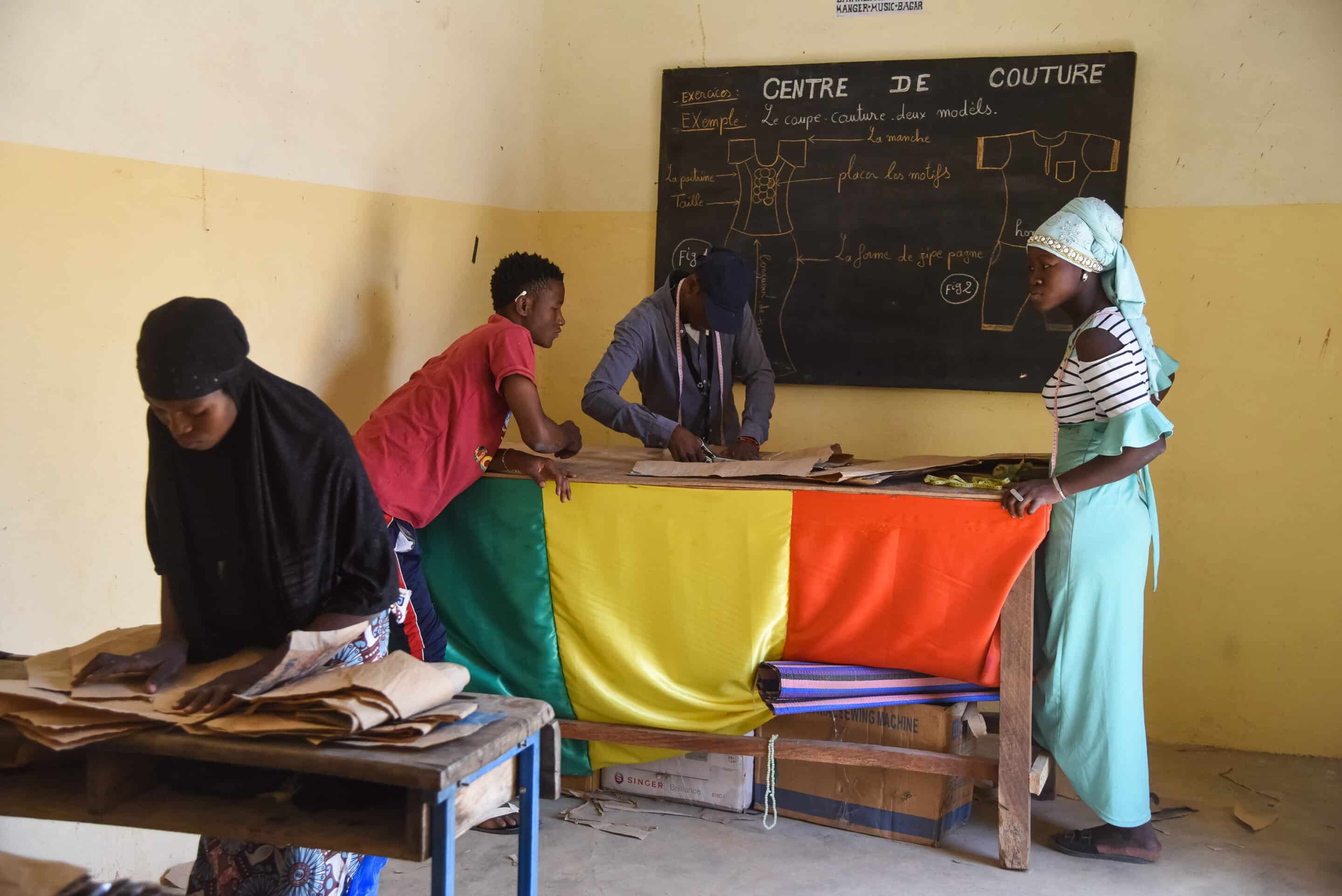
Once the ZAE has been set up, how can its ongoing economic sustainability be guaranteed?
Above all, by providing each service at a pre-established price in line with potential users’ purchasing power. We should point out that, in setting these prices, we always bear in mind the regulatory constraints as well as the operating costs of the infrastructure.
This is a fine balance to achieve and must be validated by the various stakeholders.
So who are the stakeholders in this kind of project?
There are presently three main protagonists: the municipality, the GBA manager and the VSEs (which may form themselves into an association).
Their interaction is based on sound contractual relations and a delegated management model, whereby public infrastructure is managed by a private operator.
It’s now five years since the first GBA was set up in Konséguéla, so how are things going?
Very well! After two years’ operation, we can see several positive signs, although it should be remembered that the life of African rural businesses is not all plain sailing:
- 1 plot of municipal land covering 4400 m²
- 750 m² of small-scale bioclimatic buildings
- 1 solar power station, including a photovoltaic array of 12.5 KWc (unit of power for a solar panel) and storage capacity of 118 KWh
- 1 generator of 20 kVA (kilo-volt-ampere, unit of power of a meter in a domestic installation) running on jatropha oil (local biofuel)
- 10 VSEs in place, including five managed by women
- 6 MWH/year (megawatts-hour/year) consumed
- 68,500 euros/year turnover for the VSEs
- 35 jobs created and 150 jobs consolidated
Encouraging results which drove the establishment of a second GBA in Koury in 2019. Do you have any feedback yet?
Yes, we do. This time, it’s a pilot project set up at the initiative of a local association, the Artisans and Workers of Koury (ASAOK), with the aim of helping them to improve their working conditions.
After several meetings and a visit to the Konséguéla GBA, a Productive Energy Centre (PEC) project came into being, complementing the existing hybrid power station run by the operator Yeelen Kura (Malian rural electrification operator).
The initial results are so far very promising:
- 1 plot of ASAOK land covering 10,000 m²
- 800 m² of small-scale bioclimatic buildings
- 1 solar power station producing10.4 KWc with 27 KWh storage capacity
- 1 generator of 20 kVA running on jatropha oil (local biofuel)
- 1 MV line 1 km long, linking the PEC to the Yeelen Kura power station
- 15 small businesses identified and supported (business plans, formalization, access to credit, etc.) in the process of installation on site
- 1 young Malian woman engineer recruited to handle the technical and commercial management of the site
What kind (s) of financial backing have you received for these two ZAEs?
For the one in Konséguéla, we were fortunate to get support from the European Union, French Global Environment Facility (Fonds Français pour l’Environnement – FFEM), AFD (French Development Agency), French International Solidarity Committee (Comité Français pour la Solidarité Internationale – CFSI), Synergie Solaire endowment fund, Nexans foundation, Michelham foundation, Un Monde par Tous foundation, ECODIS and the EDF Foundation.
For the GBA in Koury, funding was arranged under the FISONG (Energy Innovation Facility for NGOs) of AFD, with support from the Nexans foundation, Michelham foundation, Synergie Solaire endowment fund and Swedish Embassy in Mali through SIDA.
Not forgetting the very strong commitment of the Artisans Association to fundraising and obtaining a loan to cover more than 50% of the costs of the buildings!
Moving on from these first two successful experiments, your strategy now involves scaling up. Can you tell us about this?
Geres is looking to promote and spread the GBA concept in Mali and the sub-region. Following this logic, we decided to launch a scaling-up strategy to roll this solution out more quickly along two main lines:
- Developing GBA projects instigated by Geres, taking care to ensure the long-term sustainability of the infrastructure
- Helping partners to roll out GBAs in their areas, making sure that the fundamentals are respected
Our hope is that, over time, Geres role can be phased out (see diagram below).
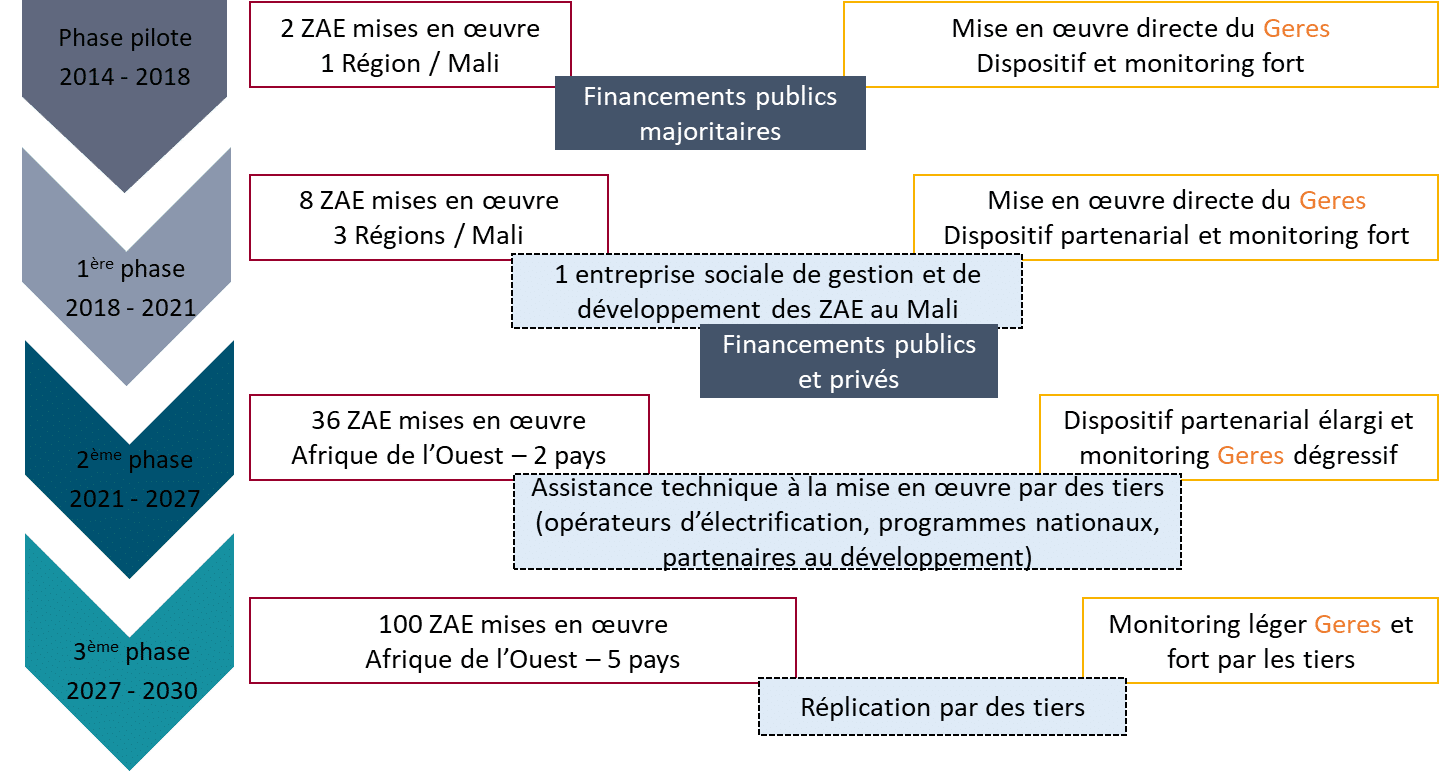
In the circumstances, why suggest setting up a social enterprise?
In our opinion, the continuity of infrastructure financed with public money and managed by one or more private operators depends on putting a social enterprise in place to manage the GBAs.
The three key ideas informing our thinking are:
- Ensuring both the stability of the GBAs at local level and their ability to bounce back from hard knocks
- Pooling technical and commercial functions so that the GBAs can run smoothly
- Amalgamating several micro-projects in a larger-scale project more likely to attract and reassure potential investors
We also feel it worth stressing that the need to find acceptable solutions to mobilize public and private investment is amongst the challenges faced when developing such an enterprise.
Finally, sound management of these different funding sources helps to bring high-quality solutions within reach of a target group often considered as insecure and disadvantaged.
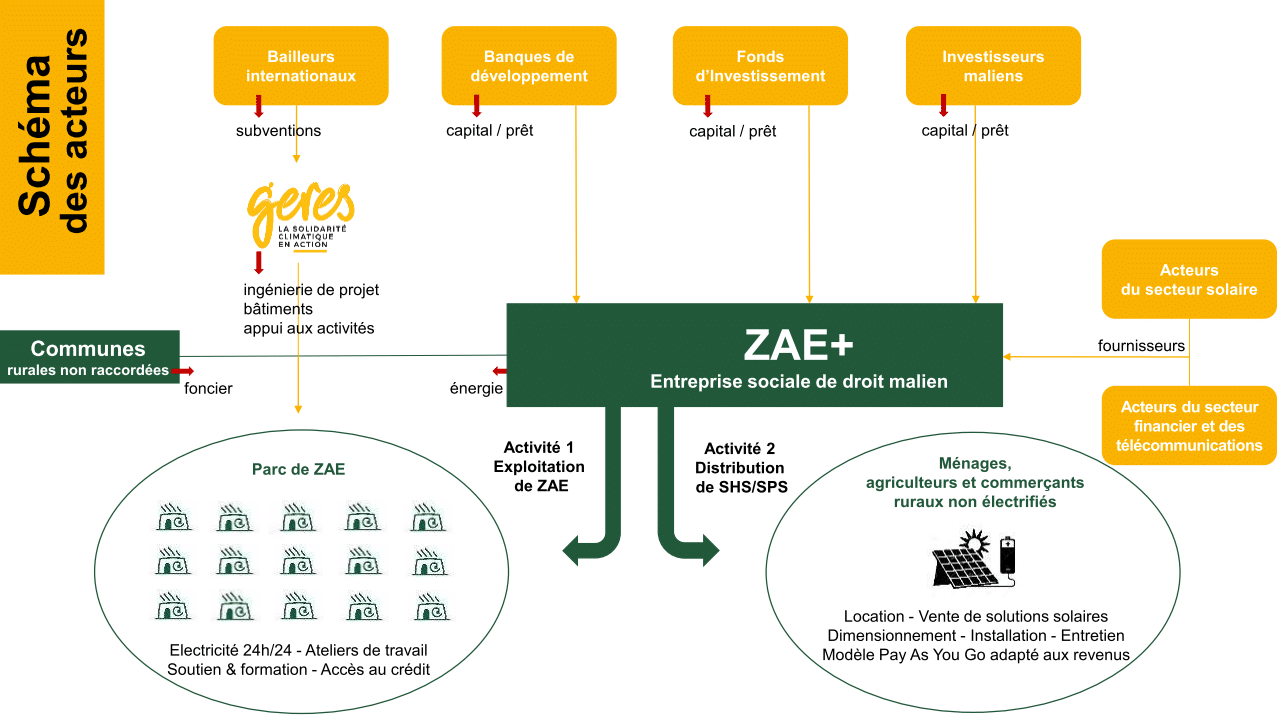
Did this strategic thinking help you to come up with other specific solutions in the field?
Yes, definitely! The establishment of technical and economic renewable energy capacity in rural areas with a view to managing a GBA offers an opportunity to roll out stand-alone solar solutions in isolated villages.
While Geres, as an NGO, has focused on energy for rural businesses, a topic largely ignored by other operators in the sector, looking into the development of a social enterprise to manage the GBAs led us to think about stand-alone last-mile solar solutions, including for households.
The aim of the proposed social enterprise is to make quality accessible at an affordable price in isolated areas. The equation can work thanks to innovative financial engineering and a last-mile local maintenance service.
What are the next stages now?
An initial scaling-up stage is currently in progress in Mali, with funding from the Swedish International Development Agency, and will result in the establishment of six new GBAs by 2021. It will of course view the emergence of the social enterprise as a key project priority.
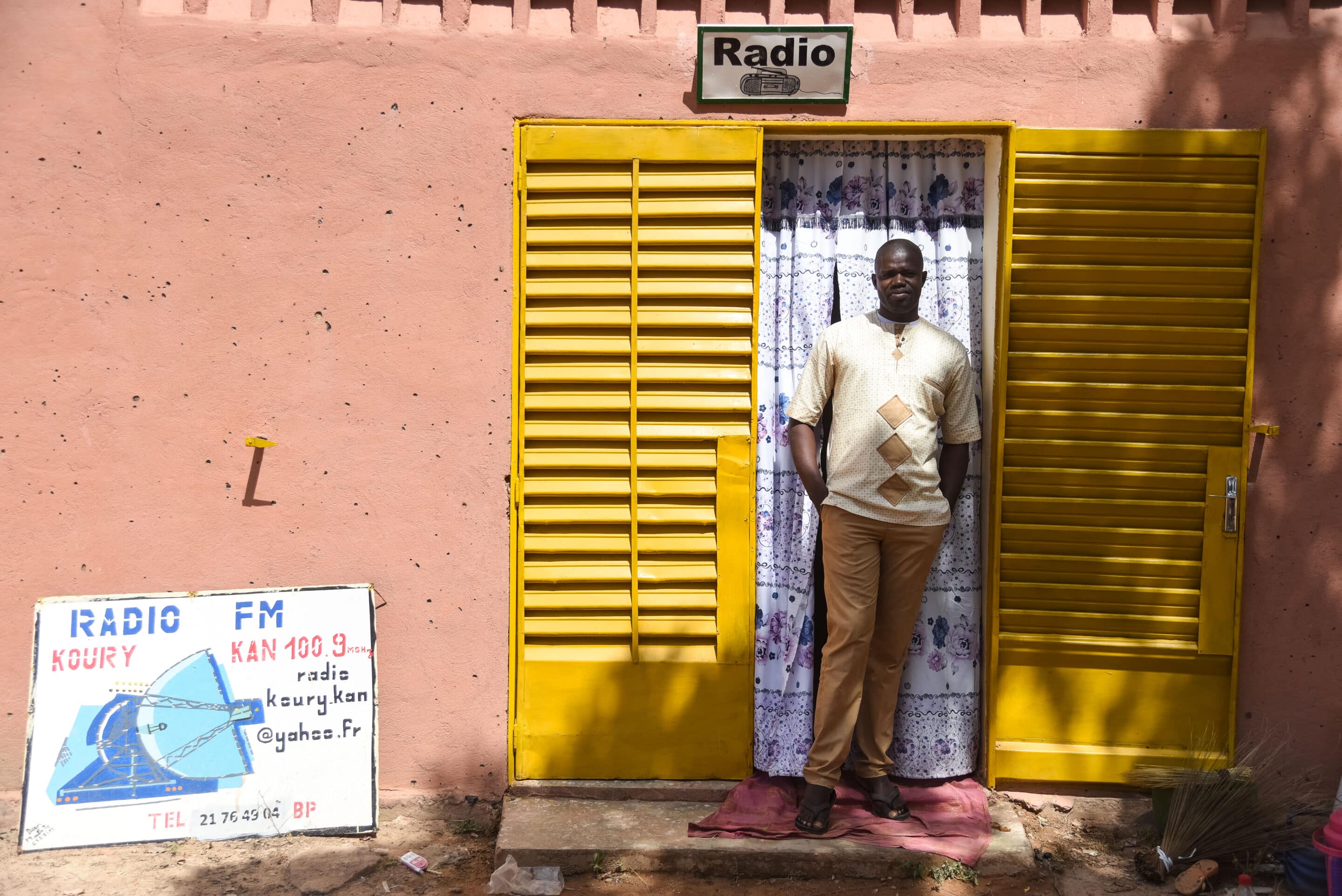
Find out more about access to sustainable energy for everyone in Mali.
Interview conducted by Anna Revert, Geres communications officer.
VOUS SOUHAITEZ AGIR EN FAVEUR DE LA SOLIDARITÉ
CLIMATIQUE ET SOUTENIR NOS ACTIONS ?
Dites-nous qui vous êtes et découvrez vos moyens d’action
CITOYEN·NE·S
Parce que la Solidarité climatique est l’affaire de toutes et tous, le Geres vous donne les clés pour passer à l’action.
ENTREPRISES
En tant que dirigeant·e d’entreprise, employé·e ou client·e responsable, vous avez le pouvoir d’agir au quotidien.
INSTITUTIONS & COLLECTIVITÉS
Soutenez nos actions en France et à l’international et devenez un acteur de la Solidarité climatique.
FONDATIONS
En vous engageant aux côtés du Geres, vous contribuez à la mise en œuvre d’actions innovantes et concrètes.
